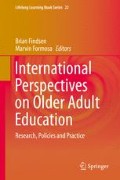Abstract
Elder learning in China has its cultural tradition of Confucianism, and also has experienced rapid development in contemporary times under the conditions of socio-economic transformation. The Chinese government takes the leading role in elder learning development by issuing relevant policies and providing resources. The University of the Third Age (U3A) is the primary mode of older adults’ learning in mainland China. Since the first U3A was established in China in 1983, the number of U3As has boomed to more than 40,000 with diversified courses offered to older learners. Further, other forms of elder education such as community learning and long-distance have undergone growth in the past decades. Elder education in China requires more resources and clearer guidance in the future. Greater development of elder learning in China hinges upon the consideration of social context, keeping up with the times, and meeting elders’ learning demand.
Access this chapter
Tax calculation will be finalised at checkout
Purchases are for personal use only
References
China Association of Universities for the Third Age (Ed.). (2010). Zhongguo chengshi laonian jiaoyu yanjiu [Research on the elderly education in urban China]. Beijing: Higher Education Press.
China Internet Network Information Center. (2013). The 31st China internet network development statistic report. Retrieved August 30, 2013, from http://www.cnnic.net.cn/hlwfzyj/hlwxzbg/hlwtjbg/201301/t20130115_38508.htm
China National Committee Office on Ageing. (2007). Forecasting research on the trend of ageing in China. Beijing: China National Committee on Ageing.
China National Committee Office on Ageing. (2012). Recommendations on further strengthening the development of older adults’ culture, China.
China National Committee Office on Ageing, Ministry of Civil Affairs, National Family Planning Commission, Ministry of Labour, Ministry of Personnel, Ministry of Health, National Education Commission, Ministry of Finance, All-China Federation of Trade Union and All-China Women’s Federation. (1994). Schema of the development of work on ageing for seven years (1994–2000), China.
Gao, L. (2005). Beijingshi laonian daxue fazhan xianzhuang yu duice yanjiu [Study on the development actuality and solution for the University of Third Age in Beijing]. Thesis for Master’s degree, China Agricultural University, Beijing.
Gu, X. (2013). Zai guoji laonian daxue xiehui lishihui ji quanti huiyi shang de zhici [Opening address on the plenary meeting of International Association of Universities of Third Age]. Laonian jiaoyu (Laonian daxue) [Education Journal for Senior Citizens] (6), 8–9.
Hong, N. (2007). Qianxi woguo laonian jiaoyu shiye de fazhan [A brief introduction of the development of elder learning in China]. Journal of Guangxi University for Nationalities (Philosophy and Social Science Edition) (S2), 20–21.
Lee, W.-O. (1996). The cultural context for Chinese learners: Conceptions of learning in the Confucian tradition. In D. Watkins & J. B. Biggs (Eds.), The Chinese learner: Cultural, psychological and contextual influences (pp. 25–42). Hong Kong: Comparative Education Research Centre.
Lu, J. (2008). Zhongguo laonian jiaoyu 25 nian lilun yanjiu gongzuo de shuli [The summary of the theoretical research on elder education in China in the past 25 years]. Laonian jiaoyu (Laonian daxue) [Education Journal for Senior Citizens] (12), 15–22.
Lui, Y. H., Leung, A., & Jegede, O. J. (2002). Research report on overseas experience in providing continuing education for older persons. Hong Kong Open University of Hong Kong.
Maslow, A. H. (1970). Motivation and personality (2nd ed.). New York: Harper Row.
National Bureau of Statistics of China. (2011). 2010 nian diliuci quanguo enkou pucha zhuyao shuju gongbao [Communique of the main data from China’s sixth national census in 2010]. from http://www.stats.gov.cn/tjfx/jdfx/t20110428_402722253.htm
National People’s Congress of China. (2012). Law on protection of rights and interests of seniors (Amendments), China.
Qingdao Morning Newspaper. (2012). Shang laonian daxue redu kan be gaokao [U3A registration is as hot as the college entrance exam]. Retrieved June 10, 2013, from http://edu.qingdaonews.com/content/2012-10/23/content_9457924.htm
Shen, H. (1999). Laonian jiaoyu: Shijiexing de gongtong keti [Elder education: A common issue worldwide]. Educational Science Research (2), 40–46.
Swindell, R. (2000). A U3A without walls: Using the internet to reach out to isolated older people. Education and Ageing, 15(2), 251–263.
Thompson, J. (2002). The amazing University of the Third Age in China today. Retrieved July 1, 2012, from http://worldu3a.org/resources/u3a-china.htm
United Nations. (2013). World population prospects: The 2012 revision, from http://esa.un.org/unpd/wpp/unpp/panel_population.htm
Wang, Y. (2006). Dangdai zhongguo jiating jiegou biandong fenxi [The changing family structure in contemporary China: An analysis]. Social Sciences in China (1), 96–108.
Wang, Y. (2009). Zhongwai laonian jiaoyu bijiao [Comparison of elder education in China and abroad]. Xueshu luntan [Academic Forum] (01), 201–205.
Xiao, C. (2000). China: Lifelong learning and the use of new technology. Retrieved March 4, 2010, from http://www.techknowlogia.org/TKL_Articles/PDF/171.pdf
Yuan, X. (2011). Guanyu fazhan laonian jiaoyu shiye de jige wenti [Some issues about the development of older adult education]. In J. Sun (Ed.), Zhongguo laonian jiaoyu: Tansuo yu shijian [Education for the elderly in China: Research and practice] (pp. 3–9). Beijing: Science Press.
Yuan, L. (2013). Laonian jiaoyu de chuangxin yu fazhan: zai guoji laonian daxue xiehui lishihui ji quanti huiyi shang de jianghua [Innovation and development of elder education: Speech on the plenary meeting of the International Association of Universities for the Third Age]. Laonian jiaoyu (Laonian daxue) [Education Journal for Senior Citizens] (6), 11–12.
Zhang, K., & Guo, P. (2009). Zhong guo ren kou lao ling hua he lao nian ren zhuang kuang lan pi shu [The blue book of China’s population ageing and the current status of the elderly]. Beijing: China Social Science Press.
Zhou, L. (2004). Chenshi shequ laonian jiaoyu xianzhuang yu duice yanjiu [Research on elder education in urban community]. Thesis for Master’s Degree, Minzu University of China, Beijing.
Author information
Authors and Affiliations
Corresponding author
Editor information
Editors and Affiliations
Rights and permissions
Copyright information
© 2016 Springer International Publishing Switzerland
About this chapter
Cite this chapter
Zhao, X., Chui, E. (2016). Mainland China. In: Findsen, B., Formosa, M. (eds) International Perspectives on Older Adult Education. Lifelong Learning Book Series, vol 22. Springer, Cham. https://doi.org/10.1007/978-3-319-24939-1_9
Download citation
DOI: https://doi.org/10.1007/978-3-319-24939-1_9
Published:
Publisher Name: Springer, Cham
Print ISBN: 978-3-319-24937-7
Online ISBN: 978-3-319-24939-1
eBook Packages: EducationEducation (R0)

